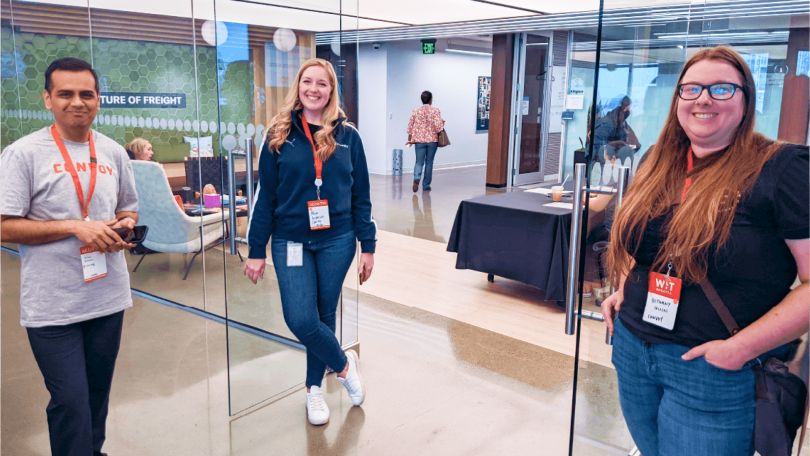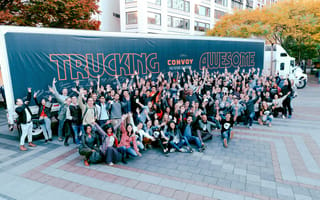“Shoot for the moon,” motivational speaker Les Brown once said. “Even if you miss, you’ll land among the stars.”
Whether in scientific endeavors or inspirational metaphors, the Herculean task of space exploration has long been the epitome of human ambition. And for freight tech company Convoy, whose digital platform uses machine learning and automation to streamline the trucking ecosystem, the theme of extraterrestrial inspiration has become a chance to foster creativity and cross-functional ambition for its employees.
Moonshot, an annual week-long event held at the company, invites all employees to collaborate with colleagues from across departments to generate ideas.
Convoy anchors the event by offering a blank slate to teams, where proposed ideas can range from subtle workflow improvements to extravagant displays of company pride. Many winning projects have become cornerstones of company culture or core business functions.
“We called it Moonshot because one of our values is to think big,” said Director of Engineering Rylan Hawkins. “We might know how to get to the top of the mountain, but if you push for the stars you can end up on the moon.”
At its heart, Moonshot is a supercharged conduit for creativity, condensed into a spirit week for all things Convoy. But the company’s people-forward foundations also make the event a chance to break up the normal processes of everyday work life.
“They create connection, understanding and learning that helps them even after the event,” Hawkins said. “In that week, they find ways to create something truly different.”
A Convoy of Ideas
Moonshot might have started as notes on a makeshift whiteboard, but today it’s an important part of the company’s product roadmap. Since its inception in 2018, the event has produced more than 600 projects, 40 award winners and 110 finalists. Many of the ideas have gone on to become core aspects of Convoy’s offerings, including QuickPay Expansion, Convoy for Brokers and Carrier Web 2.0.
Moonshot came about from an iterative process of culture-building.
“It was the Wild West,” said co-founder and CXO Grant Goodale with amusement. “Everybody wrote on a makeshift whiteboard and put sticky notes with their names next to ideas they wanted to work on.”
The year after the inaugural Moonshot, Goodale and his team went to work implementing a new structure and a longer timeframe for the event — much of it due to his past experiences with hackathons at Amazon. The changes were an investment in Convoy’s future — a gesture of faith in its talented employees as well as the products that would come out of it.
“We’ve seen all kinds of stuff come out of Moonshot from across the spectrum,” Goodale recounted. “But the real value is people recognizing that they can work with people from disparate disciplines and build something amazing in a week.”
First-time Moonshot attendee Gwendolyn Tobar, a customer experience specialist, agreed. Coming from a retail background with no requisite knowledge of the freight industry or tech, she was nevertheless drawn to the energy of the hackathon.
“I have never seen a space with that many creative people at once,” Tobar exclaimed. “It was just a beautiful chaos for invention.”
True to Goodale’s vision, Tobar came away from her first Moonshot with an energized view of the company’s potential. Her team was one of the award winners, but more importantly, she saw Convoy as a place of collaborative development and an open environment that encouraged her to aim for the moon.

The Sky Is Not The Limit
In its second year, Moonshot made a drastic transformation: A week-long extravaganza that pushed the creative limits of Convoy’s employees. To that effect, project entries of every conceivable nature were encouraged.
Not simply constrained to the office, teams working on projects would often go out and talk to customers, check out physical locations or simulate GPS coordinates in an attempt to try something different. Underpinning the versatile nature of the projects are events sprinkled throughout the week, including a Convoy-themed movie.
“We had one employee figure out what’s called a curtain van, which is a semi-trailer with vinyl on the sides,” Goodale recalled. “They got someone to drive it into Westlake Park in downtown Seattle, and the whole company came out to sign it and take photos.”
“It’s a celebration of the possible.”
The Convoy-branded marketing stunt wasn’t a prototype that could be realized into a future product or a feature that facilitated internal workflow, but it was a true Moonshot product in form and function. Employees were inspired to paint on blank canvases, so long as it was in any way related to Convoy and its open work culture.
“It was an amazing Moonshot project because nobody thought it could be done,” Goodale said of the curtain van. “It’s a celebration of the possible.”
It Takes a Crew to Reach the Stars
Moonshot is now a well-established, culture-building event for Convoy employees, and newcomers are encouraged to dive head-first into the chaos. In her first year at the event, Tobar’s team project won the Aluminum Foil award for TLDR, an internal sticky notes tool that resonated strongly among her colleagues — so much so that the feature was implemented within months after the award was presented.
Fostering such creative energy couldn’t work without an iterative process in place, and Convoy made it a point to carve out space for teams to work across departments and roles, all while having personal time to incubate their own ideas.
“I spent the whole week in the office, because that’s how passionate we were about our project,” Tobar said with enthusiasm. “We worked with our leaders to get the time we needed.”
Part of Moonshot’s tangential benefit was to introduce employees to other functions that help support the company’s foundations. For a customer-facing team member like Tobar, it was a revelation diving into the backend and peeking at the magic behind the curtains.
“I did a little bit of coding, talked to a couple PMs and a lot of people at work,” she listed. “There was innovative energy emanating from every person. You could hear people bouncing ideas off each other on Zoom across the room.”
Organized Chaos
Such organic collaboration came about from a properly anchored infrastructure. On the surface, there are standard procedures such as the judging process, video presentations and 3D-printed moon trophies. To keep the Moonshot engine humming, the company also injected promotional tools such as a listings website where anyone can submit their ideas and organized Slack channels to keep momentum flowing.
Tobar was inspired by her interactions with more technical colleagues, and Moonshot opened the door to something more. “It turned my attention to finding something new I could do internally, like software engineering.”
Such a revelation didn’t surprise Hawkins, who saw this potential pivot as a cornerstone of the Moonshot experience. “This is a chance for people to investigate what it’s like to be in a different role,” he explained. “And it’s during these times that people decide to change careers.”
“There was this innovative energy that was coming off of every person.”
Taking the Long Shot
During the Covid-19 years, Moonshot transitioned to a hybrid model. Though leadership was unsure which part of the company culture would survive the pandemic, Moonshot remained a top priority in adapting to the unknown.
The bet paid off. With a set structure in place, employees are free to flex their own creative process. On the surface, it was a chance for the company to throw darts on a board and run experiments to see what stuck. But there was a method to the chaos. Hidden among the countless ideas and creations was a common thread of driving the company forward in its quest to modernize the analog freight industry. Though winning projects may take years to develop, the seeds of future innovations are planted in the most unexpected moments at Moonshot.
One such instance came in the second year, when Convoy’s then-director of risk management ran down the middle aisle of the room draped in a Canadian flag. His team had managed to transport a paid cell phone order from the US to Canada, before Convoy even had that line of business. Today, cross-border shipments are a staple of Convoy’s digital freight offerings.
“It proved that you can materially change an entire business,” Goodale said. “Turns out, if you give people a week to scratch their own itch and make their lives — and the lives of people around them — better, they’ll take you up on it.”









